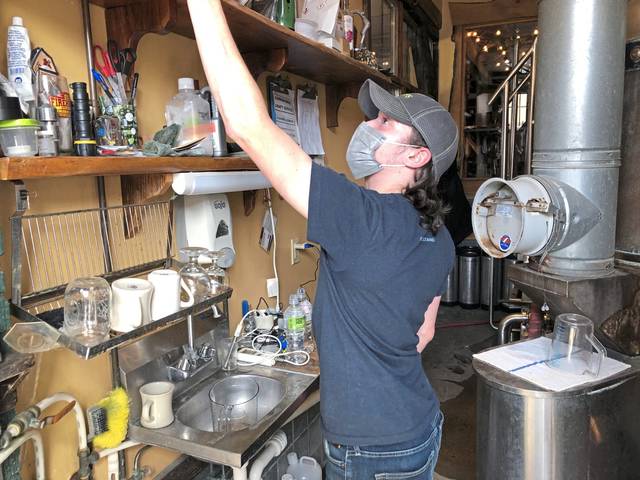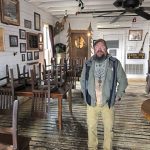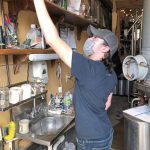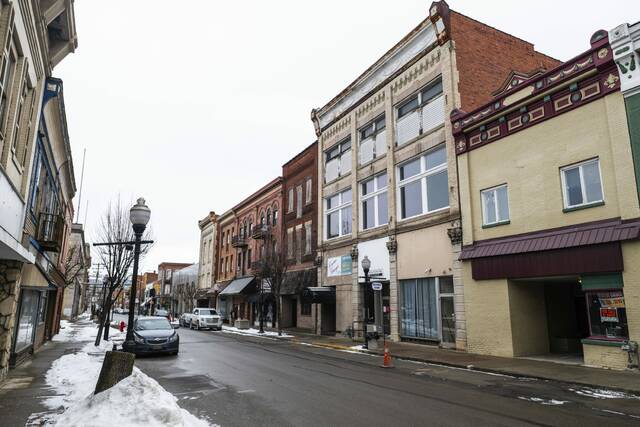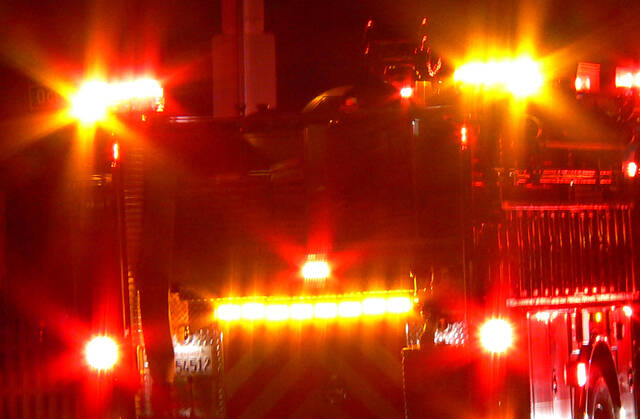The owner of North Country Brewing in Slippery Rock believes he did everything right.
When faced with the initial covid-19 shutdown orders implemented by the governor a year ago — the first of which, right before St. Patrick’s Day, cost him about $32,000 in wasted food — Robert McCafferty closed. He tried to do takeout, he said, but his business just couldn’t sustain it.
“It was all very new,” he said. “We understood the severity of everything.”
So they made it through last spring, and got to work rebuilding in the summer when some restrictions were lifted, and he could reopen.
McCafferty spent $15,000 to implement mitigation measures and purchase personal protective equipment for his employees and sanitizing stations for his three locations in Slippery Rock and Harmony.
He installed new air conditioning in the kitchen to make it tolerable for kitchen staff to wear masks.
Then, in July, the state restricted alcohol sales. It prohibited bar service and reduced indoor capacity to 25%.
About four months later, the governor shut down alcohol sales for the Wednesday night before Thanksgiving.
The final straw, McCafferty said, was the complete ban on all indoor dining for two weeks, starting on Dec. 10.
The entire holiday season was lost.
McCafferty filed a lawsuit and request for an injunction against Gov. Tom Wolf and then-Health Secretary Rachel Levine on Dec. 24, accusing them of intentionally manipulating data and thereby destroying consumer confidence in the restaurant industry.
“It’s a targeting of this industry. I don’t understand why,” he said.
His attorney, Rebecca Black, argued in court earlier this month that they believe the connection between covid spread and restaurants “is attenuated at best.
“It’s very strained if it’s there at all, and I think our data shows that,” she said, citing the state health department’s own numbers.
McCafferty is not trying to get out of the mitigation measures. Instead, all he wants is for the state to be enjoined from enforcing any new closures or prohibitions on indoor dining, alcohol sales and capacity at his locations.
“We want to move forward. I’ve been looking and hoping for a pathway to move forward, and we just don’t have that,” McCafferty said during a hearing in federal court March 3. “We’re really just out in the wind.”
The business
McCafferty, 53, majored in environmental geoscience at Indiana University of Pennsylvania and worked as an archaeologist after graduation. Among the coolest work he did, he said, was excavating a soldier in 1996 in Gettysburg.
“I loved my job, but it was all travel, living in hotels,” he said. “It was either go back to school or try something brand new.”
McCafferty had worked in bars and restaurants to get himself through college and enjoyed it. So in 1998, he and his wife, Jodi, bought an old funeral home on Main Street in Slippery Rock with plans to open a restaurant. At the time, the town was still dry.
McCafferty took a full-time job bartending at night at the nearby Harmony Inn. They renovated the now 216-year-old building during the day.
They lived there during the renovations — at one point their bedroom was where the bar is now. The couple replaced the foundation — some of the old stones now frame the outdoor fireplace. They removed the tin ceiling and used it to make the backsplash behind the bar and on the walls.
McCafferty found felled trees in West Virginia, had them milled and turned it into his tables.
In 2001, Slippery Rock voted to allow alcohol sales. North Country Brewing opened in February 2005. A few years later, the McCaffertys bought a farm and created their own farm-to-table practice, including raising Scottish Highland cattle.
They opened a cannery in 2012, and then bought the Harmony Inn in 2013.
Bob McCafferty loves being part of the Butler County community — participating in events and serving on local boards. He has always tried to be good to his employees, making sure they had health care and were paid good wages.
In 2019, he and his wife sold the farm. They looked forward to being able to use the profits from the sale to make improvements at all three of their locations.
Instead, the pandemic arrived.
The pandemic
Before covid, North Country Brewing employed 206 people.
Early on in the pandemic, McCafferty had to lay off 150 employees — although he was able to keep them on their health care. He brought his staff back in May, when things started to reopen in the “green phase,” but then, there were new rules implemented by the state in July.
Through the summer and fall, he said, the good weather and lots of outdoor seating helped them break even. But then, McCafferty said, November came with rising covid cases, hospitalizations and deaths.
“The consumer confidence was just gone in November. People just stopped going out,” he said. “Our sales were dead.”
And although North Country looked at the night before Thanksgiving as one where they could make up some ground, the governor shut down alcohol sales.
And then, there was the two-week closure in December.
“That is the last of our winter hope right there,” McCafferty testified during the March 3 hearing before U.S. District Judge Christy Wiegand.
The restaurant lost about $15,000 in food it couldn’t use when the announcement was made. And the holiday closure cost North Country $200,000-$300,000, testified its director of operations, Janine Simmons.
“They replaced that out of their own money to make sure payroll was met,” she said of the McCaffertys.
From 2019 to 2020, sales at North Country Brewing dropped $2 million, he said in an affidavit in the case. And net profits went from $746,710 in 2019, to $900 in 2020.
The money from the sale of the farm has gone not toward making improvements, but just keeping their doors open.
McCafferty said he’s hoping for a good spring with mild weather.
“If things don’t go well, it’s going to be tough to make it to May,” he said. “There’s nothing left.”
He also said he can’t get a loan.
“Banks aren’t lending to restaurants.”
The only reason North Country is open now, he continued, is because of the two rounds of federal Paycheck Protection Program money that they’ve received.
The science
As part of his lawsuit, McCafferty alleged that the state is manipulating data — placing blame for community spread on restaurants when the numbers, he says, just don’t add up.
The state has blamed restaurants for 50% to 55% of positive cases since August, McCafferty testified. When he does the math, that number is more like 3% to 6%.
As an example, in news releases, the state health department has repeatedly said that case investigators have found through contact tracing that large numbers of people who tested positive for covid-19 reported having been at bars and restaurants.
However, that 55% number is often relative to the proportion of people who willingly answer state contact tracers, which is often less than half.
For example, in a Sept. 28 news release from the Department of Health, of 5,747 confirmed cases, only 42% of people who were contacted answered whether they’d been in a business in the 14 days leading up to symptoms. Of that 42%, 350 answered that they had. Of that number, 194 had been at a restaurant.
That number, McCafferty said, does not equal 50% of positive cases.
During the injunction hearing, the state called Peter Blank, a policy director for the state Department of Health, to testify.
He told the court that masking has proved to be one of the most effective ways to prevent the spread of covid-19, and that when people eat in restaurants, they must remove their masks, leading to potential spread.
However, when he was asked by Black, North Country’s attorney, if there was evidence to establish a link between increased case numbers and bars and restaurants, Blank could not answer definitively.
“Research has been ever-changing and indicated indoor gatherings have led to spread,” he said.
“Do you have any reason to believe bars and restaurants were a cause of a significant rise in cases?” she pushed.
Blank again wavered, saying only that experts have identified bars and restaurants as “high risk.” He added that the Centers for Disease Control and Prevention has continued to say that ordering takeout is the best option for eating out.
When Black asked Blank the basis of the department’s orders limiting alcohol sales to only go with food, Blank responded that studies have focused on that issue.
“You can’t tell me which medical experts reviewed it and which study it was?” she asked.
“I cannot.”
Later, he added, “Studies do show definitively that bars and restaurants show a high risk of transmission.”
But, McCafferty is not challenging the mitigation measures in place, he said. He willingly follows them.
“We do believe the science,” he said. “We want the science to be followed. Put a mask on. Do what we need to do, and let’s get through this together.
“I’d be horrified if I had anything to do with any sort of spread from my business.”
Black argued to Wiegand that her client ought to get an injunction against the state taking any further action.
“He’s asking to pursue his livelihood while continuing to comply with mitigation efforts,” she said. “Maybe restaurants are a riskier situation, but that doesn’t mean that risk can’t be remediated.”
But Chief Deputy Attorney General Karen Romano argued to the court that it’s difficult to get people who are being contact traced to answer the case investigators’ questions in the first place. And, she continued, in many cases, family members might be exposed by a relative, so they won’t trace back to a restaurant, even though that’s where the first relative was exposed.
“That’s one of the limitations of contact tracing,” Romano said. “You can’t pinpoint it exactly.”
She argued that restaurants and bars are being treated the same as other businesses.
More than that, she said that an injunction is not about protecting monetary interest.
“The public health and safety must outweigh the pecuniary interest of the plaintiff.”
The future
Although the upstairs of North Country remains closed, and there is no bar service, McCafferty is now up to 120 employees.
He’s hoping for good weather this spring and summer and lots of outdoor dining as the vaccine becomes more readily available.
“Consumer confidence is back,” he said. “People are feeling better about the situation.”
But he is also fearful. Because at each step along the way during the pandemic, as McCafferty hoped they had turned the corner, the state implemented a new order that set him back.
He said he tries to lead his staff, to no avail.
“I can’t lead them when I feel like I’m not being led.”



